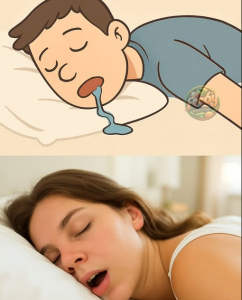If You Drool While Sleeping Often, Check for These 6 Diseases — A 1000-Word Guide
Drooling during sleep might seem harmless — or even a little embarrassing — but frequent, excessive drooling can be a sign of underlying health issues that shouldn’t be ignored. While occasional drooling is normal, especially in deep sleep phases, persistent nighttime drooling might signal medical conditions affecting your muscles, nerves, or swallowing mechanisms. Here are six possible health concerns tied to frequent drooling and what you should know about each.
1. Obstructive Sleep Apnea (OSA)
What It Is:
Obstructive Sleep Apnea is a potentially serious sleep disorder where your breathing repeatedly stops and starts during the night. It often happens when throat muscles intermittently relax and block the airway.
Connection to Drooling:
When the airway is blocked, people with OSA may sleep with their mouths open to get more air. This mouth-breathing increases the likelihood of saliva escaping and drooling onto the pillow. The body’s struggle to get oxygen can also cause abnormal swallowing reflexes during sleep.
Other Symptoms to Watch For:
-
Loud snoring
-
Gasping for air during sleep
-
Morning headaches
-
Daytime fatigue
-
Poor concentration
What to Do:
If you suspect sleep apnea, consult a doctor or sleep specialist. A sleep study (polysomnography) may be required. Treatments include CPAP machines, dental devices, or lifestyle changes.
2. Gastroesophageal Reflux Disease (GERD)
What It Is:
GERD is a chronic condition in which stomach acid frequently flows back into the esophagus, irritating its lining.
Connection to Drooling:
The body sometimes produces more saliva in an attempt to neutralize acid that comes up from the stomach. Lying down at night can worsen reflux, increasing the chance of drooling. In some cases, GERD causes difficulty swallowing (dysphagia), which can also lead to excessive saliva buildup.
Other Symptoms to Watch For:
-
Heartburn
-
Sour taste in the mouth
-
Chest discomfort
-
Hoarseness in the morning
-
Chronic cough
What to Do:
Diet changes, sleeping with the head elevated, or medications like antacids and proton pump inhibitors (PPIs) can help. In persistent cases, further evaluation by a gastroenterologist is recommended.
3. Neurological Disorders
What They Are:
Conditions such as Parkinson’s disease, cerebral palsy, stroke, and amyotrophic lateral sclerosis (ALS) can affect the brain and muscles involved in swallowing and saliva control.
Connection to Drooling:
Neurological impairments may weaken the muscles responsible for closing the mouth or coordinating swallowing, leading to drooling. This is particularly common in Parkinson’s patients, where facial muscle stiffness and reduced swallowing reflex contribute to saliva pooling.
Other Symptoms to Watch For:
-
Muscle weakness or stiffness
-
Tremors
-
Poor coordination
-
Difficulty speaking
-
Swallowing problems
What to Do:
If you notice other signs of neurological dysfunction, seek medical advice immediately. Treatments may include medication, physical therapy, or speech/swallowing therapy depending on the diagnosis.
4. Allergies and Sinus Infections
What They Are:
Allergic rhinitis or chronic sinusitis can lead to nasal congestion, especially at night.
Connection to Drooling:
When the nose is blocked, breathing through the mouth becomes necessary, increasing the chances of drooling. Additionally, excess mucus and postnasal drip can contribute to increased saliva production.
Other Symptoms to Watch For:
-
Stuffy or runny nose
-
Itchy eyes or throat
-
Sneezing
-
Coughing (especially at night)
What to Do:
Manage allergies with antihistamines, nasal sprays, or allergen avoidance. For chronic sinus issues, you may need decongestants, antibiotics, or even surgery in severe cases.
5. Tonsillitis or Enlarged Tonsils
What It Is:
Tonsillitis is inflammation of the tonsils, usually due to a viral or bacterial infection. In children and adults with naturally enlarged tonsils, airflow during sleep can be restricted.
Connection to Drooling:
Swollen tonsils can make it hard to swallow properly or close the mouth comfortably during sleep. This causes saliva to build up and eventually escape as drool.
Other Symptoms to Watch For:
-
Sore throat
-
Difficulty swallowing
-
Red, swollen tonsils (sometimes with white patches)
-
Fever
-
Swollen lymph nodes in the neck
What to Do:
Mild cases may resolve with rest and fluids, while bacterial infections might require antibiotics. Chronic or severe cases may lead to a tonsillectomy (surgical removal).
6. Medication Side Effects
What Happens:
Some medications — especially those affecting the nervous system or increasing saliva production — can lead to drooling during sleep.
Common Culprits Include:
-
Antipsychotics (e.g., clozapine)
-
Alzheimer’s medications (e.g., donepezil)
-
Muscle relaxants
-
Certain tranquilizers and sleep aids
Connection to Drooling:
These drugs can either stimulate the salivary glands or suppress the ability to control oral muscles, especially when lying down and relaxed.
Other Symptoms to Watch For:
-
Drowsiness
-
Muscle weakness
-
Dry mouth during the day (in some paradoxical cases)
What to Do:
Talk to your doctor if you suspect a medication is the cause. They may adjust your dosage, switch prescriptions, or provide strategies to manage the side effects.
When Should You Be Concerned?
Occasional drooling is usually nothing to worry about. However, if it becomes frequent and excessive — especially if paired with other symptoms like choking, snoring, or weight loss — it’s important to investigate further. Chronic drooling can also affect self-esteem, cause skin irritation, and disrupt relationships if left unaddressed.
How to Manage Drooling at Night
In addition to treating underlying causes, here are a few general tips:
-
Change Sleeping Position: Sleeping on your back helps keep saliva in your mouth rather than letting it spill out.
-
Stay Hydrated: Dehydration can cause thick saliva, which increases drooling.
-
Practice Good Oral Hygiene: This helps reduce bacteria buildup and mouth infections that might worsen saliva issues.
-
Use Orthodontic Devices: In some cases, a dentist may suggest a mouthguard or oral device to improve muscle control.
-
Consult a Specialist: ENT doctors, neurologists, or sleep specialists can offer targeted help based on the root cause.
Final Thoughts
Though it might seem like a minor inconvenience, frequent nighttime drooling can be a red flag for various health conditions — from sleep apnea to neurological disorders. Rather than brushing it off, take it as an opportunity to learn more about your body’s signals. Early detection and treatment can not only reduce drooling but also prevent more serious complications down the road.

